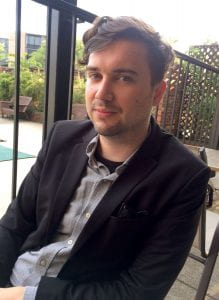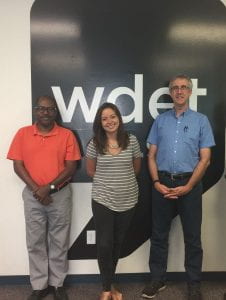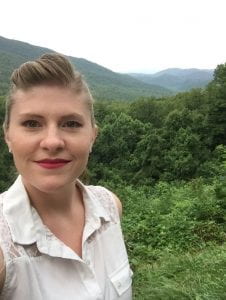Samantha Ellens (Anthropology), InsideOut Literary Arts Project; Charles H. Wright Museum of African American History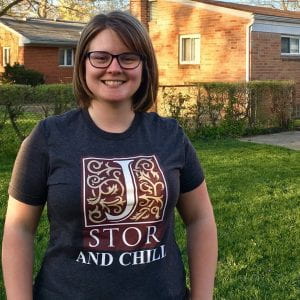
“As a Ph.D. student in Anthropology, the Humanities Clinic internship gave me practical experience in engaging with public projects outside of academia. It was also an excellent way to connect with Detroit institutions both inside and outside of Wayne State that I may not have had the opportunity to work with otherwise. With the InsideOut Literary Arts Project, I assisted staff by analyzing qualitative interview data related to Citywide poets, their after-school program directed at Detroit teens. I used my anthropological skills to examine how this program has impacted InsideOut’s students and offered suggestions for future programmatic development. At the Charles H. Wright Museum of African American History, I aided curators with developing a new exhibition for 2018 which will explore Detroit’s role in the history of African American hair and fashion. Here my research included gathering historical information, locating nationally held collections, and identifying other relevant museum exhibits around the country. Working with both community partners was an excellent way to recognize the application of my humanities training and the value of anthropology in non-profit and public history settings.”
Colleen Grant (Spanish/Classical and Modern Languages, Literatures and Cultures), Wayne State University Press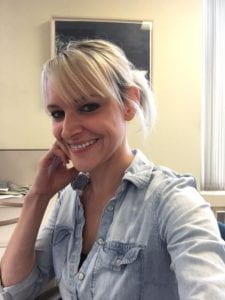
“Serving as an intern at the Wayne State University Press as part of the [Humanities Clinic] internship program has provided me with an opportunity to gain invaluable experience that I would have otherwise never had at this point in my academic career. During my time at the Press, I worked primarily with the marketing department. I began by becoming acquainted with the overall process of publishing and learning about the current changes that are occurring in the industry due to the recent push for online publication. One of my first tasks was to write a batch of catalog copy for the Spring/Summer 2018 books. Another task that was assigned to me by the Marketing Director was to add the Spring/Summer 2018 Alberta Press books to Biblio, the online book database. All of the information entered into Biblio feeds directly to the website, so it required extreme attention to detail while handling a large amount of information. It also allowed me to become familiar with the specific details of publishing, marketing, and selling books, such as dimensions, ONYX codes, subject codes, prices, carton quantities, et cetera. The [Humanities Clinic] internship program allowed me to gain experience in marketing, a field in which I would otherwise have little to no credible experience.”
Andrew Hnatow (History), Wayne State University Press
“I interned for the Acquisitions department of the Wayne State University Press. Broadly speaking, Acquisition is responsible for reviewing all manuscripts and proposals submitted to the press, soliciting manuscripts, organizing and overseeing peer review, presenting projects to the editorial board for approval, and, if approval is forthcoming, preparing contracts for authors/volume editors and updating the press’s project database. Thus, the day-to-day tasks were diverse and often required engaging with a wide degree of subjects and disciplines. The press was generous in how much it involved me in its day-to-day operations. I was invited to attend any meetings that were being held, and to contribute my thoughts. This included acquisitions meetings, joint acquisitions and marketing meetings, launch meetings, pre-launch meetings, editorial board meetings, book birthday meetings, cover meetings, meetings with authors, marketing meetings, and strategic planning meetings. Doing so gave a wonderful overview of the operations of the press, both in terms of how all the departments work together, but also the course of producing a book from acquisition to promotion after its release.”
Diana Rosenberger (English), WDET-FM
“My role as an intern was to produce “copy” for WDET, Detroit’s local NPR station. My first responsibility was to compile a “top ten” list of headlines from the morning’s local news. The News Director would then select one or two of these stories for me to pursue. This was followed by some brief research; not only did I need to know any necessary information, but also the best people to call for a potential phone interview, how to reach them, and what follow-up questions to ask. I would go into a private studio and record the phone interview, usually lasting about ten minutes. Using digital software, I would select and edit this sound bite, smoothing over the “ums” and “ahs,” as well as minimizing any awkward silence. I would write my copy around this sound bite, eventually passing the document on to one of my superiors. At WDET, I learned to think differently about what it can mean to “write well.” Writing, in any context, is still writing; it’s determined by choices in style and diction and sentence structure, it’s imprecise and subject to individual preference. And while writing “well” can certainly mean different things to different people—we naturally expect different discourse from public radio than we do in a dissertation—writing that is meant to be understood by anyone is usually a sign of good writing for everyone.”
Kathryn Slocum (Anthropology), Evelyn Scott Society; Jewish Family Service; Hellenic Museum of Michigan
“During the course of the WSU Humanities Clinic internship, I completed three projects for the Evelyn Scott Society, the Jewish Family Service, and the Hellenic Museum of Michigan. For the Evelyn Scott Society, I created a bibliography of recent works about Scott. The project and the work I completed are outlined below. For Jewish Family Service, I created a timeline of the organization’s history, with primary emphasis on its origins and beginnings to be used for a 100-year celebration. Overall, the internship proved valuable to the organizations that submitted the proposals and allowed me to expand my research techniques, assist the local community, and build professional relationships. I assisted the Hellenic Museum in converting their digital records on their collections for use with new software and made recommendations about their cataloging practices. All three organizations extended their gratitude to WSU for the opportunity. It is clear from their responses that the WSU Humanities Clinic made a great difference to organizations that had an overabundance of work and little staff. As a research intern, I was able to assist these groups by transferring knowledge gained from academic learning at WSU and apply it to hands-on projects that made a difference to the community.”

